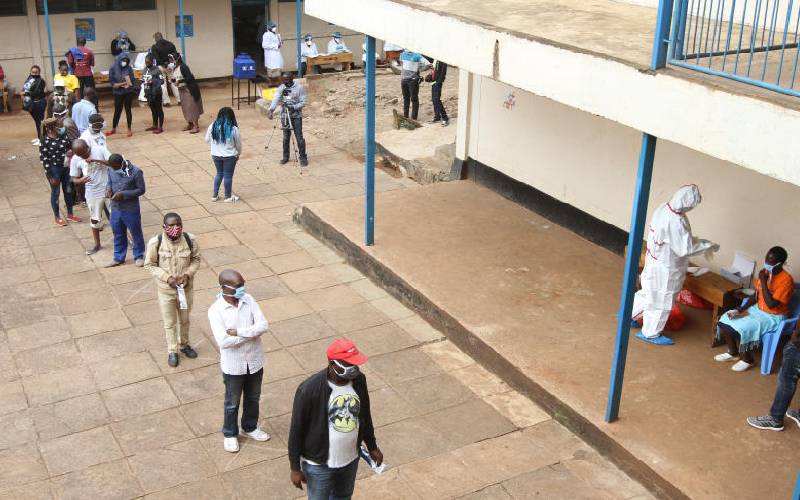
Members of public line up during the Covid-19 mass testing at the Olympic Primary school, Kibra, Nairobi County in May. [File, Standard]
The Ministry of Health (MoH) received a record Sh83 billion by June as the government loaded up ammunition in the fight against Covid-19.
This is the highest expenditure by the Health ministry in a financial year, much of which went into fighting the deadly viral disease that has disrupted economic activities countrywide, with millions being rendered jobless.
Efforts to curb the spread of the virus saw the ministry spend an additional Sh10 billion in the financial year that ended on June 30, with a big chunk of the cash being used to purchase protective equipment for health workers, testing kits, setting up and running quarantine facilities, and treating those infected.
In June, the National Treasury disbursed Sh28 billion to the Health Ministry, pushing the tally of the money spent that financial year to Sh83 billion, compared to Sh73 billion in Financial Year 2018/19.
What MoH received from the Exchequer in June is more than half the total disbursements to the Afya House-based ministry in the first 11-months of the fiscal year under review.
Recurrent expenditure - used for paying salaries and other administrative expenses - gobbled up Sh52 billion in a year that also saw the government hire more health workers.
Another Sh30.4 billion was used for development expenditure such as buying testing kits, furnishing intensive care units with more beds, or repairing hospitals.
The government also disbursed Sh5 billion to the counties to boost their healthcare capacity to fight the pandemic.
Most of the development cash for the ministry is borrowed from multilateral institutions that finance the treatment of diseases such as malaria, tuberculosis and HIV/Aids.
However, this time the ministry received funding from multi-lateral partners to strengthen the healthcare system so as to flatten the Covid-19 curve.
The country received Sh78.3 billion under the Rapid Credit Facility of the International Monetary Fund to help address the impact of the Covid-19.
Kenya also received Sh108 billion from the World Bank under the second Development Policy Operation, as both budgetary support and extra resources to help fight the pandemic.
Initially, the World Bank extended support of Sh6.8 billion under the Contingency Emergency Response to the ministry for preparedness and response to Covid-19.
Of the money, the country first received Sh1 billion, whose expenditure elicited criticism from a section of the public who felt it had not been prudently spent.
Deplorable
African Development Bank extended Sh22.5 billion to Kenya to help deal with the health and economic crisis of the pandemic. There was an additional Sh7.5 billion commitments from the European Union in form of grants.
“But to build the necessary health infrastructure for such undertakings requires time. We must get ahead of this pandemic by creating lead time,” said President Uhuru Kenyatta.
Part of the money will also be used for the universal healthcare.
Unfortunately, financing of healthcare has been deplorable, with total health expenditure per capita for most sub-Saharan African countries, in the most recent year with data, being $32 (Sh3,400).
This is less than half the levels recommended by WHO for low-income countries. It is costly to train and pay health personnel.
As at the end of 2018, Kenya had 11,667 registered doctors, which translates to one doctor for every 4,028 people.
This is against a recommended ratio of one doctor for every 1,000 people.
Further, there are 110 registered nurses for every 100,000 Kenyans against WHO recommendations of 250 health workers for a population of 100,000.
Reports indicate that it would cost between Sh7 million and Sh8 million to set up a standard ICU.
Kagwe said Kenya planned to set up 1,000 new ICU beds, translating to a total cost of about Sh8 billion.
The country has slightly over 260 functional ventilators, necessary for Covid-19 patients who have difficulty in breathing. However, more than half of these are being used to manage other critical patients.
In the current financial year, the Government has allocated Sh1 billion to recruit health workers.
 The Standard Group Plc is a multi-media organization with investments in media
platforms spanning newspaper print
operations, television, radio broadcasting, digital and online services. The
Standard Group is recognized as a
leading multi-media house in Kenya with a key influence in matters of national
and international interest.
The Standard Group Plc is a multi-media organization with investments in media
platforms spanning newspaper print
operations, television, radio broadcasting, digital and online services. The
Standard Group is recognized as a
leading multi-media house in Kenya with a key influence in matters of national
and international interest.











